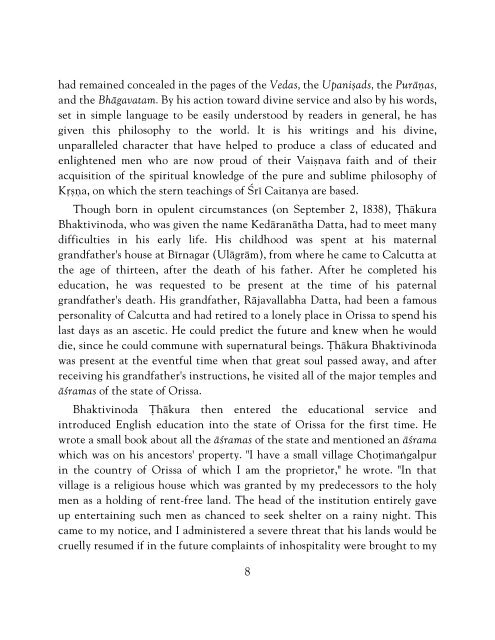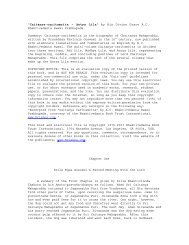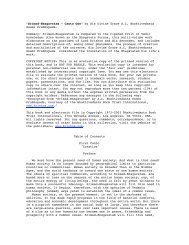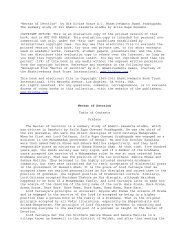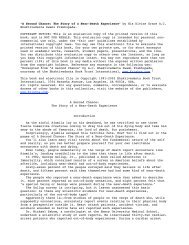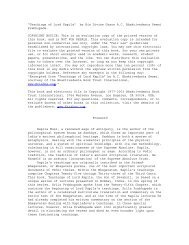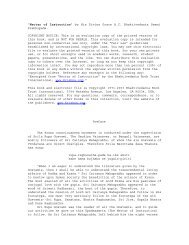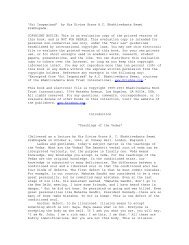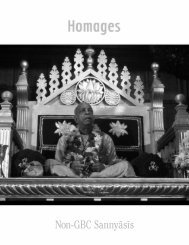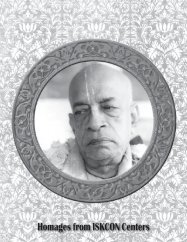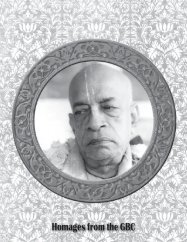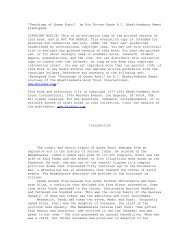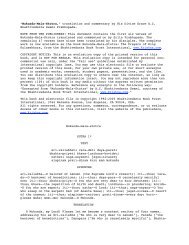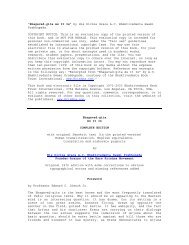- Page 1 and 2: Foreword Introduction Songs of the
- Page 3 and 4: 43. Çré Rädhikä-stava 44. Çré
- Page 5 and 6: egulations of Vaiñëava character,
- Page 7: meaning and they lead to such succi
- Page 11 and 12: writer Baìkimacandra. This novelis
- Page 13 and 14: without contributing his mite, howe
- Page 15 and 16: Sevä-kuïja, Våndävana Standard
- Page 17 and 18: SYNONYMS vande—offer my respectfu
- Page 19 and 20: täriëe—who are delivering. TRAN
- Page 21 and 22: SYNONYMS namaù—obeisances; te—
- Page 23 and 24: Çréla Jagannätha Praëati gaurä
- Page 25 and 26: O most munificent incarnation! You
- Page 27 and 28: SYNONYMS jayatäm—all glory to; s
- Page 29 and 30: Çré Rädhä Praëäma tapta-käï
- Page 31 and 32: Hare Kåñëa Mahä-mantra HARE KÅ
- Page 33 and 34: energy of the Lord, changed to Hare
- Page 35 and 36: väditra-mädyan-manaso rasena rom
- Page 37 and 38: The spiritual master is always offe
- Page 39 and 40: çré—auspicious; caraëa-aravind
- Page 41 and 42: Raghunätha däsa Gosvämé; çré-
- Page 43 and 44: TRANSLATION I offer my respectful o
- Page 45 and 46: land of Våndävana where there are
- Page 47 and 48: çré-govardhana-kalpa-pädapa-tale
- Page 49 and 50: vardhanam-increasing; prati-padam-a
- Page 51 and 52: Text Four na dhanaà na janaà na s
- Page 53 and 54: yugäyitaà nimeñeëa cakñuñä p
- Page 55 and 56: Text Two çré-siddhänta saraswat
- Page 57 and 58: one becomes happy and gets Your ass
- Page 59 and 60:
I emphatically say to you, O brothe
- Page 61 and 62:
Your message. Text Six tomära icch
- Page 63 and 64:
transcendental songs, is establishe
- Page 65 and 66:
Text Fourteen äniyächo jadi prabh
- Page 67 and 68:
Text Two 'täthaé täthaé bäjalo
- Page 69 and 70:
moments to death. Text Five udita t
- Page 71 and 72:
kåñëa-näma-sudhä koriyä pän,
- Page 73 and 74:
ämi binä bandhu ära ke äche tom
- Page 75 and 76:
hare räma hare räma, räma räma
- Page 77 and 78:
(from Kalyäëa-kalpataru) Audio Pa
- Page 79 and 80:
gopénäth, sakali tomära mäyä n
- Page 81 and 82:
phenomenal world, You expand Your d
- Page 83 and 84:
gopinäth; kabe vä-and when?; jäg
- Page 85 and 86:
täi heno mama gati SYNONYMS gopin
- Page 87 and 88:
O Gopénätha, I have fallen into t
- Page 89 and 90:
manake-my mind; çamiyä-subduing;
- Page 91 and 92:
SYNONYMS gurudev!-O Gurudeva!; kåp
- Page 93 and 94:
will not maintain; ära-any longer.
- Page 95 and 96:
Text Four janmäobi moe icchä jadi
- Page 97 and 98:
hakativinoda kohe, çuno käna! rä
- Page 99 and 100:
Text Five lalitä viçäkhä-ädi j
- Page 101 and 102:
TRANSLATION Reading on and on, my h
- Page 103 and 104:
itself to be worthless ignorance. M
- Page 105 and 106:
TRANSLATION According to Your will
- Page 107 and 108:
swa-prasäd-anna dilo bhäi sei ann
- Page 109 and 110:
Text One 'rädhä-kåñëa' bol bol
- Page 111 and 112:
eg. Chant, chant "Rädhä-Kåñëa!
- Page 113 and 114:
SYNONYMS kabe-when?; gaura-vane-in
- Page 115 and 116:
SYNONYMS gauòa-braja-jane-the inha
- Page 117 and 118:
taste the name's nectar sublime. Wh
- Page 119 and 120:
Text Six kabe nityänanda, more kor
- Page 121 and 122:
Çuddha-bhakata (from Çaraëägati
- Page 123 and 124:
May I always visit all the holy pla
- Page 125 and 126:
Text Seven tulasé dekhi', juräya
- Page 127 and 128:
nanda-yaçomaté-citta-häré-who h
- Page 129 and 130:
çañkulé piñöaka khér puli pä
- Page 131 and 132:
Text Nine chale-bale läòòu khäy
- Page 133 and 134:
take rest with Lord Balaräma. Text
- Page 135 and 136:
Lalitä-devé and the other gopés
- Page 137 and 138:
umbrella over Lord Caitanya's head.
- Page 139 and 140:
TRANSLATION The brilliance of Lord
- Page 141 and 142:
SYNONYMS amala harinäm-these pure
- Page 143 and 144:
(from Çaraëägati) Audio Text One
- Page 145 and 146:
of Hari. Please bless me by giving
- Page 147 and 148:
Text Two nåsiàha vämana, çré-m
- Page 149 and 150:
As Rämacandra He brought about the
- Page 151 and 152:
He increases the ecstasy of His dev
- Page 153 and 154:
Text Three äçeña kämanä, hådi
- Page 155 and 156:
activities—only sinful activities
- Page 157 and 158:
TRANSLATION Hundreds and thousands
- Page 159 and 160:
anger, greed, envy, illusion, and m
- Page 161 and 162:
TRANSLATION At that moment I though
- Page 163 and 164:
(from Gétävalé) Audio Text One n
- Page 165 and 166:
TRANSLATION In supreme happiness, t
- Page 167 and 168:
(from Prärthanä) Audio Text One h
- Page 169 and 170:
TRANSLATION Lord Kåñëa, who is t
- Page 171 and 172:
SYNONYMS ära kabe-and when?; nitä
- Page 173 and 174:
Purport to Lälasämayé Prärthan
- Page 175 and 176:
Audio Text One hari haraye namaù k
- Page 177 and 178:
Sanätana, Raghunäth Bhaööa, Çr
- Page 179 and 180:
TRANSLATION When these six Gosväm
- Page 181 and 182:
the first two lines of this song, a
- Page 183 and 184:
In a forest of small kadamba trees
- Page 185 and 186:
TRANSLATION Narottama däsa, the se
- Page 187 and 188:
Where are my Raghunätha Bhaööa a
- Page 189 and 190:
Anyone who has accepted the two lot
- Page 191 and 192:
person; rädhä-mädhava-antaraìga
- Page 193 and 194:
Generally, devotees first chant çr
- Page 195 and 196:
had His pastimes are as good as Vå
- Page 197 and 198:
TRANSLATION The lotus feet of our s
- Page 199 and 200:
tri-bhuvana-throughout the three wo
- Page 201 and 202:
SYNONYMS hä hä-alas! alas!; prabh
- Page 203 and 204:
Purport to Sävaraëa-çré-gaura-p
- Page 205 and 206:
should always pray for the mercy of
- Page 207 and 208:
Manaù-çikñä Teachings to the Mi
- Page 209 and 210:
dharo nitäi-caraëa du'khäni SYNO
- Page 211 and 212:
What will be the result of acceptin
- Page 213 and 214:
Narottama däsa confirms, nitäi-ca
- Page 215 and 216:
They are the perfection of rasa, an
- Page 217 and 218:
Audio Text One ei-bäro karuëä ko
- Page 219 and 220:
if one commits an offense to you, t
- Page 221 and 222:
te-käraëe lägilo ye karma-bandha
- Page 223 and 224:
for this and that. This is going on
- Page 225 and 226:
and His associates, it would be bet
- Page 227 and 228:
described by the great sages Sanaka
- Page 229 and 230:
SYNONYMS vasati-sits; daçana-çikh
- Page 231 and 232:
SYNONYMS kñatriya-rudhira-maye-in
- Page 233 and 234:
who feels great fear due to the str
- Page 235 and 236:
happiness, a bestower of auspicious
- Page 237 and 238:
Tértha. TRANSLATION In the beginni
- Page 239 and 240:
Text Four jayadharma-däsye khyäti
- Page 241 and 242:
üpa-sanätana-Çré Rüpa Gosväm
- Page 243 and 244:
master] of Baladeva Vidyäbhüñaë
- Page 245 and 246:
y Locana Däsa Öhäkura Audio Text
- Page 247 and 248:
no one like Lord Caitanya or Lord N
- Page 249 and 250:
so great that They make even birds
- Page 251 and 252:
TRANSLATION Day and night I remain
- Page 253 and 254:
"In the month of Kärtika one shoul
- Page 255 and 256:
itédåk sva-léläbhir änanda-ku
- Page 257 and 258:
muhuù-again and again; cumbitam-ki
- Page 259 and 260:
namas te 'stu dämne sphurad-dépti
- Page 261 and 262:
TRANSLATION On the shore of the gre
- Page 263 and 264:
Text Eight hara tvaà saàsäraà d
- Page 265 and 266:
Lord!; loinu çaraë—I have taken
- Page 267 and 268:
Audio Text One jaya rädhe, jaya k
- Page 269 and 270:
çré-nanda-yaçodä jaya-glories t
- Page 271 and 272:
Text Eight jaya dwija-patné, jaya
- Page 273 and 274:
TRANSLATION Remembering the lotus f
- Page 275 and 276:
TRANSLATION All glories to Rädhä
- Page 277 and 278:
All glories to Rädhä-känta, the
- Page 279 and 280:
Text Five locan bole mor nitäi jeb
- Page 281 and 282:
püraëa-you successfully completed
- Page 283 and 284:
Text One namo namaù tulasé kåñ
- Page 285 and 286:
give me the privilege of devotional
- Page 287 and 288:
ähmaëa; ädikäni—and so on; ca
- Page 289 and 290:
(from Çré Daçävatära-stotra) A


